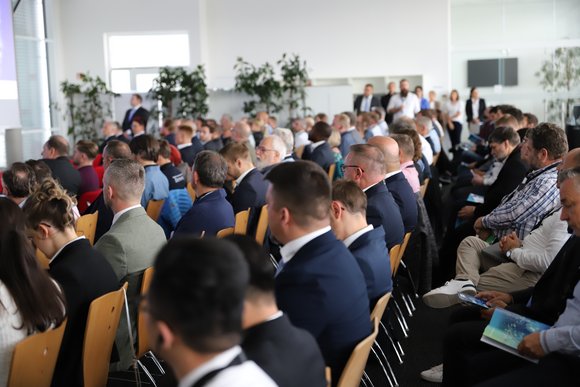The Technology Days have always served as a platform for exchanging information on the latest developments, trends and best practices in electronics manufacturing: this year, all visitors were invited to discuss the challenges and opportunities associated with automation, digitalization and the use of AI in production as well as to find out how the future of the industry can be shaped together – an offer that many were very happy to take up.
Strong for the Future – Lectures and Keynotes
The ten lectures given by in-house and invited experts on 11 and 12 September dealt with the current challenges in the electronics industry. On the first day of the event, Lisa Leonhardt and Michael Hanke from Rehm Thermal Systems spoke about the conversion of production processes from batch processes to continuous line production, Dr Patrick Bleiziffer from maXerial about industrial X-ray analytics and the use of AI to analyse X-ray data, Denny Bartels from Tonfunk GmbH Ermsleben about sustainable coatings as well as Rainer Trometer and Markus Mittermair on the future role of AI at Rehm Thermal Systems.
On Thursday, Dr Paul Wild from Rehm Thermal Systems gave a presentation on the potential applications of Rehm products in future industries such as medical technology, semiconductor production and mechanical engineering, Dr Sindy Mosch from the Fraunhofer Institute for Ceramic Technologies and Systems IKTS on the development of pastes for high-temperature electrolysis and fuel cells, Dietmar Birgel from Endress+Hauser on experiences with the processing of low-melting solder and Ingo Hild from ams OSRAM on practical measures towards the smart factory.
The presentations by the two keynote speakers were a highlight: on 11 September, Professor Dr Dennis-Kenji Kipker from the cyberintelligence.institute spoke about the importance of cyber security in production. He illustrated that German companies have been increasingly affected by espionage, sabotage and data theft in recent years, both digital and analogue, and emphasized the vulnerability of the supply chain. Following his presentation, he addressed the European Union's updated legislation on cyber security (NIS 2) for holistic economic protection and revealed to those present the need to deal more intensively with cyber security measures within their companies.
Professor Dr Isabell Welpe from the Technical University of Munich, holder of the Chair of Strategy and Organization as well as Scientific Director of the Bavarian State Institute for Higher Education Research and Planning (IHF), spoke on 12 September about the use of AI in the world of work. In her presentation, she drew attention to studies on increasing productivity using AI tools in companies and showed specific AI applications in the world of work as well as in everyday life and their downsides. She also demonstrated the further developments in AI-supported technologies and emphasized that although AI tools can support an employee, e.g. with translations, they lack real creativity and innovation.
A total of 147 visitors as well as numerous employees of Rehm Thermal Systems listened to the lectures from practice and science and used the breaks for the subsequent dialogue. Simultaneous interpreters translated the presentations in real time for the audience from abroad.
Sustainable Processes – Workshops and Live Demonstrations
The four workshops and numerous live demonstrations that took place throughout the building on both days also promoted direct dialogue and offered the opportunity to see sustainable processes up close. Interpreting services were also offered to foreign-language visitors.
The first workshop focused on the production of fuel cells: to begin with, Frank Häussler from the Centre for Solar Energy and Hydrogen Research Baden-Württemberg (ZSW) gave an overview of the structure and function of fuel cells. Matthias Drews from EKRA Automatisierungssysteme GmbH explained how the seal is applied to bipolar plates using the XH4 MultiLane screen printer and Dr Karin Hergert demonstrated the curing process in the Stack Dryer, a new system from Rehm Thermal Systems for drying membranes and bipolar plates in magazines.
In the second workshop, Gianfranco Sinistra from Rehm Thermal Systems gave an overview of possible line concepts with various degrees of automation in the areas of coating and dispensing. One highlight was the demonstration of a fully automated line with a coating and dispensing system and the RDS UV dryer from Rehm Thermal Systems as well as a transport robot for magazines and other handling systems from the ASYS Group. Finally, Markus Scheid from SIT Solutions discussed the possibilities of horizontal and vertical networking.
In the third workshop, Nico Fahrner and Julian Schempp dealt with the basics of soldering, the possible applications, the various soldering processes and the use of vacuum in soldering technology and used Rehm systems to demonstrate convection, vapour phase and contact soldering with and without vacuum. Finally, Comet Yxlon GmbH demonstrated an X-ray system for inspecting solder joints.
In the fourth workshop, Dr Paul Wild gave an overview of the system- and process-specific possibilities of the VisionXP+ from Rehm Thermal Systems for reducing nitrogen and energy consumption and drew attention to the influence of temperature profiling. Markus Mittermair, Head of Software Development at Rehm Thermal Systems, referred to the recording of consumption in the system software and the monitoring of the temperature soldering profile with the Rehm ProMetrics software and equipment from Solderstar.
Numerous info points on various products, an informative exhibition by partner companies, guided tours of the company and the new premises of the Rehm Academy as well as a visit by the Aixtreme Racing team from FH Aachen – University of Applied Sciences rounded off the extensive programme of the Technology Days 2024.
You can also read all the important information about the Technology Days programme online.
